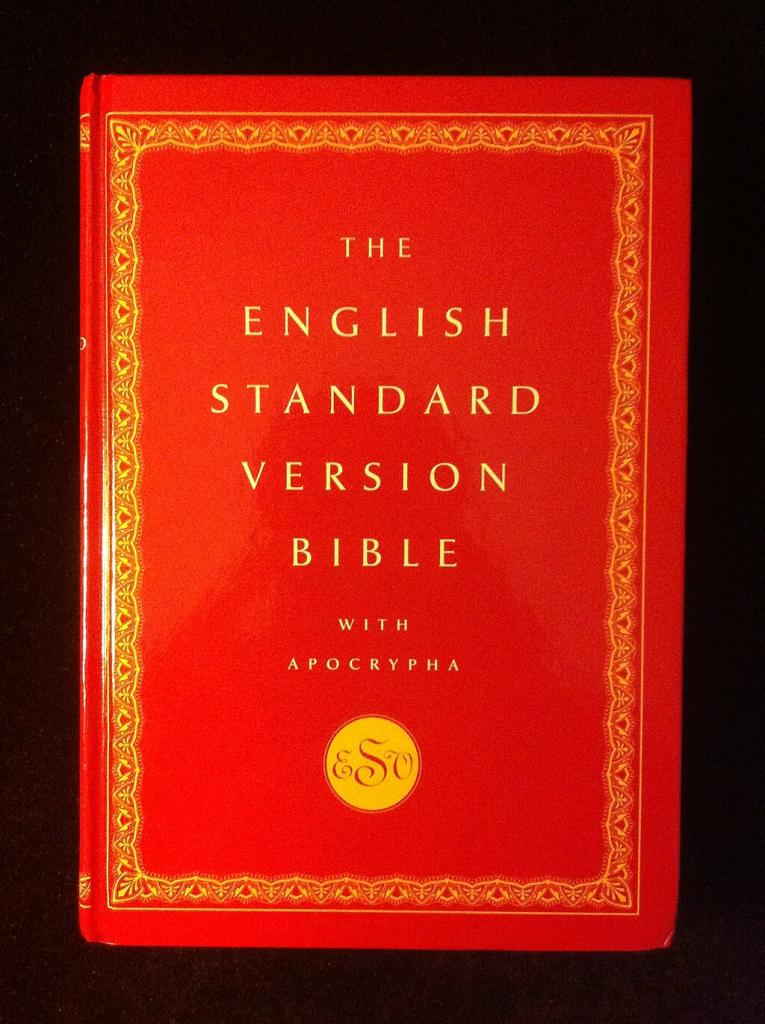The title of this post, referencing an “updated translation” of the English Standard Version of the Bible might have alarmed you. Are they going all inclusive language or toning down the commandments that some might find offensive?
“Fear not,” as classic translations including the ESV would say. Or in the words of more contemporary translations, “Don’t be afraid.” The changes are minimal, though a few are interesting. If anything, the revisions strengthen the Biblical witness. Nevertheless, there are a couple of additional changes that I’d like to see.
The English Standard Version, published by Crossway Press, began as a conservative revision of the Revised Standard Version, a modernization of the King James translation in light of modern and sometimes liberal Biblical scholarship.
In addition, Crossway brought on over 100 evangelical and conservative scholars to work with the text in light of the original languages, making the ESV into a distinct translation. Whereas many modern translators of the Bible use the “dynamic equivalent” approach to translation, which attempts to convey what the translators consider to be the meaning of the original texts, rather than the meaning of its original words, the ESV uses the “formal equivalent” approach. That is to say, it is a literal and, as much as possible, word-for-word rendition, retaining the theological language and literary qualities of the original.
Since its publication in 2001, over 315 million copies of the ESV are in circulation. It is widely used among English-speaking Christians and conservative church bodies. The Lutheran Church Missouri Synod and its publishing arm, Concordia Publishing House, use the text of the ESV in The Lutheran Study Bible, the Lutheran Service Book, and other publications.
Crossway has a committee to oversee the text and to make corrections, updates, and revisions as needed. Minor changes were made in 2002, 2007, 2011, and 2016.
Crossway has announced another update for 2025. Altogether 36 passages were altered, amounting to 42 verses and 68 words. In addition, 57 footnotes were changed and 14 verses were re-punctuated. For a complete list of revisions, go here.
Crossway’s announcement discusses the two most substantive changes:
(1) The Hebrew ‘el is now translated “for” instead of “contrary to.”
In Genesis 3:16, God tells Eve, in the words of the existing ESV, “Your desire shall be contrary to your husband, but he shall rule over you.” The revision will read “Your desire shall be for your husband, and he shall rule over you.” This is actually a return to the original 2001 text. “Contrary to” first appeared in the 2016 update and provoked some debate.
The Crossway announcement said that the reversion to the earlier reading was to remain in line with other formal equivalent translations and to preserve “the range of interpretive options in the Hebrew.” That is to say, the Hebrew word has several possible meanings that are mostly retained in “for,” whereas “contrary to” is a selection of one possible meaning that closes the others off.
That is in line with what I look for in a translation, that ambiguities should be translated as ambiguities, rather than having the translator choose one meaning to go with, shutting off the other possibilities. The announcement quotes J. I. Packer, the General Editor of the original ESV: “We respect readers when we pass along to them the job of interpretive work, not going beyond what the linguistic details require and not foreclosing the interpretive options.”
In making this change, the new ESV also changes “but” to “and,” so as not to impose a contrast that is not explicit in the Hebrew text.
In addition, the new ESV changes its rendering of the same expression in God’s statement to Cain in Genesis 4:7: “If you do well, will you not be accepted? And if you do not do well, sin is crouching at the door. Its desire is contrary to you, but you must rule over it.” The new reading will be, “Its desire is for you, and you must rule over it.”
(2) Monogenēs in John 1:18
Here is John 1:18 in the current ESV: “No one has ever seen God; the only God, who is at the Father’s side, he has made him known.” To which the proper response is: “Huh? No one has seen God, except God, who is at the side of God?”
The new version will read: “No one has ever seen God; God the only Son, who is at the Father’s side, he has made him known.”
Here is the original Greek: “Θεὸν οὐδεὶς ἑώρακεν πώποτε· ὁ μονογενὴς υἱὸς ὁ ὢν εἰς τὸν κόλπον τοῦ πατρός, ἐκεῖνος ἐξηγήσατο.” With some manuscripts reading “ο μονογενης θεος.”
The key is the word transliterated as monogenēs, which comes from the word for “one,” or “only,” + the word for “coming into being,” or “generated.” It can indeed mean “one and only.” The current ESV takes the second manuscript reading, “the monogenes God” and renders it in that sense, “the only God.” But, as Strong’s Lexicon says, “In ancient Greek culture, ‘monogenés’ was used to describe an only child or a unique offspring, highlighting the special status and value of such a child within a family.”
The first Greek manuscript reading includes the word for “son,” which is clearly what the context suggests. I suppose the other reading “the monogenes God” must come from an earlier manuscript that the ESV is following, which is kept by the new version, which then takes “monogenes” to be a reference to God’s only son. The new version clearly puts forward the deity of Christ, while also being much clearer.
But this brings me to my personal complaint about the ESV. Monogenes is the word for “only begotten”! As in John 3:16, in the King James Version, among many others: “For God so loved the world, that he gave his only begotten Son.” The Greek is “υἱὸν [son] τὸν μονογενῆ [only-begotten] ἔδωκεν [he gave].”
The ESV version is “For God so loved the world, that he gave his only Son.” “Only son” and the NIV’s “one and only son” are possible translations, but the Bible also describes Christians as “sons”:
For all who are led by the Spirit of God are sons of God. For you did not receive the spirit of slavery to fall back into fear, but you have received the Spirit of adoption as sons, by whom we cry, “Abba! Father!” (Romans 8:14-15)
Thanks to the Holy Spirit, which brings us to faith, we are adopted sons of God. Christ is the “only begotten” Son of God.
The concept of the Son being “begotten” of the Father is very important in Christology. A being “begets” another being of the same nature as itself. Christ, the Son of God, according to the Nicene Creed, is “begotten, not made.” Thus, He is “one substance with the father.” We, on the other hand, are made, created. We human beings beget other human beings, so though God graciously adopts us as His children through Christ, we are not sons of our Heavenly Father in the same sense that Jesus is, who is “begotten of His father before all worlds,” though He also shares our human nature by virtue of His being “born of the Virgin Mary.”
The original Greek version of the Nicene Creed uses a grammatical form of monogenes for “only begotten,” and the word without “mono” (only) for “begotten” all
In one Lord Jesus Christ,
the only-begotten Son of God,
begotten of His Father before all worlds,
God of God, Light of Light,
very God of very God,
begotten, not made,
being of one substance with the Father.
Of course, the Nicene Fathers, in countering the heresy of Arianism–which taught that Christ is “made,” not “begotten,” a heresy that is common again today–drew their “begotten” theology right from these passages from these passages in the Bible from the Gospel of John.
They, who spoke the language of the New Testament, recognized the “begotten” sense of these passages. So why is that sense ignored in the ESV, as well as other modern English translations (though not all)? (You can compare the different English versions here.)
I suppose many of the evangelical scholars who worked on the ESV came from non-creedal churches, though I know a number of confessional Reformed people were involved and J. I. Packer was an Anglican.
At any rate, I believe the creedal language of the church that comes from the Bible should be preserved in translations of the Bible.
One other complaint about the ESV: translating the Hebrew word rendered in the KJV as “judgments” and in other modern translation as “ordinances,” as “rules.”
Here is the RSV rendition of Leviticus 26:46: “These are the statutes and ordinances and laws which the Lord made between him and the people of Israel on Mount Sinai by Moses.”
Here is what the ESV does with it: “These are the statutes and rules and laws that the Lord made between himself and the people of Israel through Moses on Mount Sinai.”
My soul is consumed with longing for your rules at all times. (Psalm 119:20)
Turn away the reproach that I dread, for your rules are good. (Psalm 119:39)
When I think of your rules from of old, I take comfort, O Lord. (Psalm 119:52)
We long for “rules”? We take comfort in “rules”?
Don’t get me wrong. I appreciate the ESV and that’s the Bible I use. I just find myself looking forward to its next revisions, hoping that “begotten” and “ordinances” will make the cut.
Photo: The English Standard Version Bible by John, CC BY-SA 3.0 <https://creativecommons.org/licenses/by-sa/3.0>, via Wikimedia Commons













